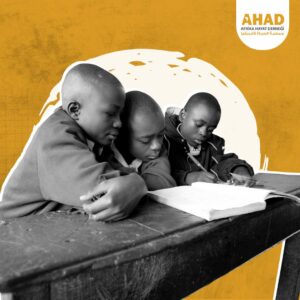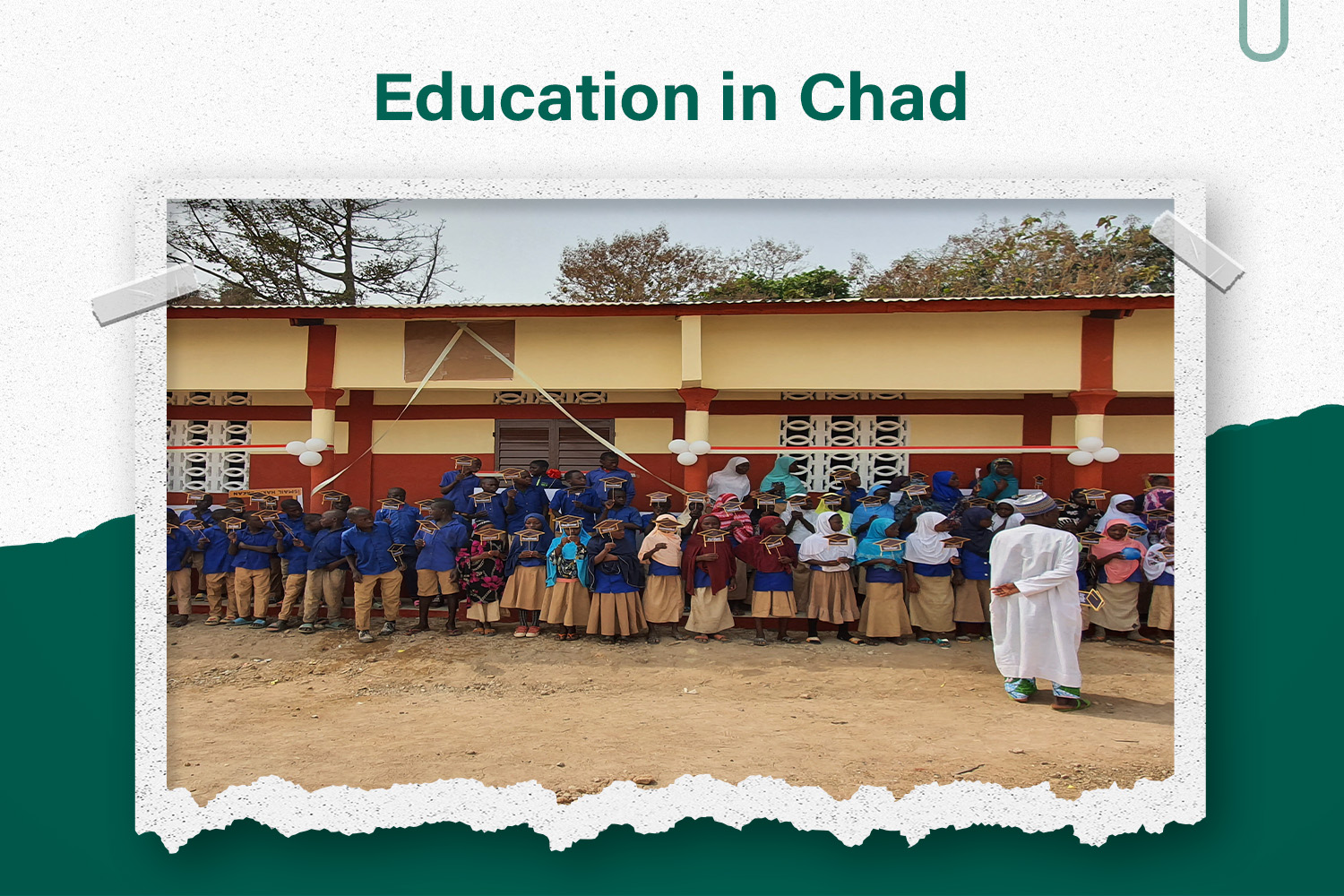Chad is a multicultural and multilingual country in Central Africa, and education plays a vital role in the development of society. Chad faces numerous challenges in the field of education, such as lack of funding and inadequate infrastructure. However, the government is actively working to improve the country’s education system. The government of Chad provides free and compulsory basic education for children from 6 to 14 years, as well as general secondary and higher education. Chad seeks to raise the level of education and provide equal opportunities for everyone to develop the skills and knowledge necessary for a bright future.
The education in Chad
Education in Chad faces many challenges that affect the quality of education and students ‘ access to equal educational opportunities. Poverty, marginalization and lack of resources are the most prominent of these challenges. Education in Chad is among the lowest in the world, with many students suffering from poor educational attainment and high school dropout rates.

Education in Chad
Challenges facing education in Chad
Education in Chad faces many challenges which include:
Resource poverty: schools in Chad suffer from a lack of books, equipment and poor infrastructure.
Inequality in access to education: there are clear differences between urban and rural areas in access to education, as rural areas lack adequate schools.
The impact of military conflicts: Chad has experienced ongoing internal conflicts, which have affected the education system and led to the displacement of many children and their cessation of Education.
Watch the following video about education in Chad here
Education reforms in Chad
To meet these challenges, the Chadian government is implementing reforms in the education sector, including:
Increase investment in education: the government is working to increase the budget allocated to education and improve the distribution of resources to provide an appropriate learning environment.
Expanding access to education: the education system in Chad aims to increase the proportion of schools and classrooms in rural areas and provide educational opportunities for all.
Improving the quality of education: the reforms focus on improving the quality of education through teacher training and updating the curriculum.
The education system in Chad needs more efforts to improve the quality of education and provide equal opportunities for all, in cooperation between the government, civil society and international organizations.
Primary education in Chad
Stages of primary education in Chad
Primary education in Chad consists of three stages, namely:
Kindergarten: it is aimed at children from 3 to 5 years old and aims to develop their basic social, sensory and language skills.
Primary grades (CP): formal primary education begins in the first grade, where students are taught basic reading, writing and math skills.
Advanced grades (CE1-CE2): at this stage, students learn more complex skills in reading, writing and mathematics, and instruction is provided in the native language (Arabic or French).

Education in Chad
Improving the quality of primary education in Chad
To improve the quality of primary education in Chad, the government is focusing on several areas, including:
Curriculum development: the government is updating the curriculum to be more applied and keep pace with the needs of students and the requirements of the labor market.
Teacher skills development: training programs are provided to develop the skills of teachers in Chad, including training them in the latest teaching methods and the use of technology in education.
Infrastructure improvement: the government is improving the infrastructure of schools by building new school buildings and providing the necessary equipment and resources.
Encourage family participation: the government promotes cooperation between schools and parents to enhance the learning experience at home and support continuous learning.
Secondary education in Chad consists of two main stages: senior and secondary second grades. At this stage, students learn more complex skills in a variety of subjects, including science, literature, history, mathematics and foreign languages. Education is provided in Arabic and French.

Education in Chad
Secondary education in Chad faces many challenges, including a lack of financial resources and poor infrastructure. There may be a shortage of qualified teachers and the necessary equipment for effective learning. In addition, students may experience difficulties in accessing secondary education due to long distances and lack of public transport.
Higher education in Chad
Higher education in Chad is constantly evolving to provide better educational opportunities and develop the knowledge and skills base of students. Higher education in Chad consists of diverse educational institutions offering diverse programs in different fields such as Medical Sciences, Engineering, Social Sciences and management.
Higher educational institutions of Chad
Chad hosts a number of higher educational institutions that provide higher education to students. Among these institutions, mention can be made of the University of Chad, Doba University, Ndjamena University, Sarh University, Mundou University, along with several technical institutes and schools of Medicine and Health Sciences.
Improving the quality of higher education in Chad
To improve the quality of higher education in Chad, the government is working to strengthen funding for educational institutions and improve infrastructure, including the modernization of facilities and the provision of necessary equipment and resources. The government is also seeking to develop advanced study programs and update curricula to be commensurate with the needs of the labor market. The government also encourages the exchange of knowledge and experience with international educational institutions through academic cooperation and bilateral partnerships.
Science and technology in education in Chad faces challenges and presents opportunities for improvement and development. The lack of resources and infrastructure challenges in some areas are one of the challenges facing science and technology in education in Chad. However, there are great opportunities to use technology to improve the quality of education in the country.
The technology of education in Chad is constantly undergoing developments, as cloud computing, virtual reality and augmented reality technologies are being used in the educational process. These developments provide opportunities to improve student interaction with educational content and promote active learning and innovation in education.
In order to promote the use of Science and technology in education, the government is working to provide professional training for teachers to learn and use technology effectively in the classroom. The government also encourages the promotion of scientific research and the development of technological innovations in the field of Education.
In short, science and technology in education in Chad faces challenges, but there are great opportunities to improve the quality of education through the application of technology and the development of scientific and technical skills of teachers and students.
Teaching languages in Chad
Teaching Arabic in Chad
Arabic is taught in Chad as one of the official languages, which is taught in schools next to French. The Arabic language is a subject that is tested in official exams, and is studied in public and private schools.
Arabic language education in Chad focuses on learning grammar, basic vocabulary, speaking, listening, reading and writing. Standardized curricula and textbooks are used to teach Arabic, language skills are enhanced through practical activities and practical exercises.
Strengthening the teaching of local languages in Chad
In addition to focusing on the teaching of official languages such as Arabic and French, the government is working to promote the teaching of local languages in Chad. Local languages are taught as an additional subject in primary schools and their curricula are developed and approved.
The promotion of the teaching of local languages aims to preserve the cultural and linguistic heritage of the peoples of Chad and to promote belonging and cultural identity. In addition, researchers believe that learning local languages enhances understanding and communication between students and the local community.
With an investment in the development of the teaching of local languages, the quality of education can be improved and inclusive learning promoted in Chad.
Chad is one of the countries facing significant challenges in the field of Education. There is a lack of educational infrastructure, as schools lack textbooks and basic educational resources. These challenges negatively affect the quality of education and students ‘ chances of getting a quality education.
To improve the education infrastructure in Chad, investment should be made in improving schools and providing the necessary educational resources. Schools should be equipped with textbooks, educational equipment and provide the necessary technological infrastructure to support modern education.
The Ahad is a non-governmental organization working in the field of education in Chad. The association aims to improve the quality of education and provide equal educational opportunities for children in Chad. The Association carries out educational and training projects and provides material and technical support to schools and teachers.
By supporting the Ahad and improving the education infrastructure, quality and inclusive education opportunities can be offered to all in Chad. The government should work in collaboration with NGOs and the local community to achieve that goal and improve the country’s education sector.
Conclusion
Challenges and recommendations for the promotion of education in Chad
Chad faces significant challenges in the field of education due to the lack of educational infrastructure and basic educational resources. To improve education in the country:
Schools should be equipped with textbooks and the necessary educational equipment.
School technology should be improved to support modern education.
Cooperation between the government, NGOs and the local community should be strengthened to achieve improvements in the education sector.
Frequently asked questions
1. What challenges does Chad face in the field of Education
Chad is facing a shortage of educational infrastructure and basic educational resources such as textbooks and educational equipment.
2. What are the recommendations to strengthen education in Chad
Schools should be equipped with necessary textbooks and educational equipment, improve school technology and strengthen cooperation between the government, NGOs and the local community.
Related articles:




